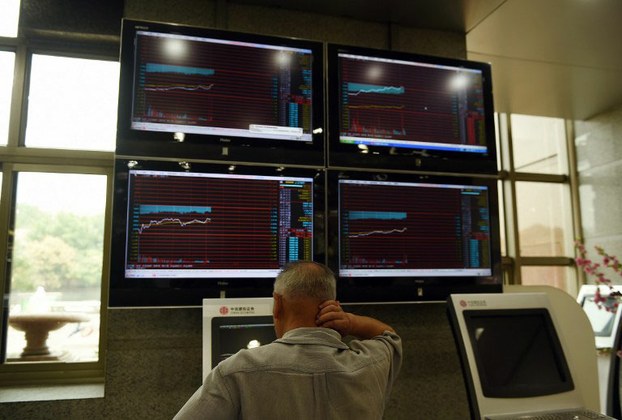




As the ruling Chinese Communist Party announced yet more measures to try to halt plummeting stock markets, experts said that merely boosting investment in the highest quality "blue chip" stocks is unlikely to stave off disaster.
"If there is panic in the markets, it is fairly normal for the government or regulatory agencies to intervene to protect share prices," Shanghai-based economist Chen Lebo told RFA on Wednesday.
"But the way we have done it here is a little strange."
On Monday, 21 major securities brokers said they had agreed to spend 128 billion yuan (U.S.$21 billion) on tracker-style "exchange traded funds" in a bid to instill confidence among investors.
But on Wednesday, the markets continued to head south, and so the country's regulator of state-owned assets ordered all state-owned enterprises controlled by Beijing not to sell any shares in their listed subsidiaries, citing "abnormal market volatility," the official Xinhua news agency reported.
China's Assets Supervision and Administration Commission also "encouraged" the SOEs to purchase more shares to stabilize prices, it said.
But Chen said it made no sense to start buying when the market still appears to be in free fall.
"The hundred twenty billion [yuan rescue package] is a drop in the ocean in a market with such huge capitalization, and it would make more sense to set up these [tracker-style] stabilization funds when the market has hit bottom," he said.
"Also, their policy of investing in blue chips is a little odd, and I don't understand the reasoning behind it."
The benchmark Shanghai composite index has plunged by more than 30 percent since June 12.
China's central bank on Wednesday issued a statement shortly after trading opened, reiterating its liquidity support, while margin trading service provider China Securities Finance pledged to purchase more shares of small- and medium-sized listed companies to ease stock market liquidity.
But while China's tightly controlled media were urging investors not to panic earlier in the week, Xinhua admitted on Wednesday that "the [government's] effort seemed to be of no avail so far."
World's 'most rotten' bourse
But according to Professor Hu Xingdou of Beijing's University of Science and Technology, the problems in China's stock markets have been a long time brewing.
"China's stock market is actually the most rotten in the world," Hu told RFA on Wednesday. "I think we can say that the enterprises on China's A share index are probably the worst listed companies in the world."
He added: "A lot of the listed state-owned are already insolvent and should be bankrupt, but [the government] allows them to raise money on the stock market so as to avoid bankruptcy."
He said close ties between many A-share listed state-owned companies and officials at the highest level of government made cleaning up the index even harder.
"They are all state-owned enterprises, with a lot of power," Hu said. "A lot of the bosses of these listed state-owned companies also hold high office, some of them at vice-ministerial level."
"So, it is very hard to regulate these state-own enterprises, because they are above the law."
Chen said the government should step very carefully.
"If they speak or act without restraint, then this will deal an even greater blow to market confidence," he said.
But he said the rescue measures are unlikely to work.
"The share market is still a market, not a tool or a method with which to manage the economy," Chen said.
"If they go ahead with this, I think it will be counterproductive."
Reported by Yang Fan for RFA's Mandarin Service, and by Wong Lok-to for the Cantonese Service. Translated and written in English by Luisetta Mudie.